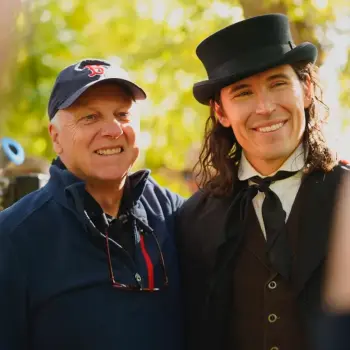Lectionary Reflections
Isaiah 65:17-25
November 17, 2013
As we turn inexorably toward the seasons of Advent and Christmas, an ever-present danger rears its hoary head. As the grocery stores pull out their plastic trees and gaudy Santas—it is November, you know—and the malls tune up their carols and twinkling lights adorn the stores while a puppet Scrooge pillories unsuspecting, though delighted, consumers, the air fairly drips with a gooey warmth and a nostalgic penumbra wreathes every heart. "It's beginning to look a lot like Christmas," croons an immortal Andy Williams, adding his burnished tenor to the festive mood. Who does not look forward to this bubbling bath of sights, scents, and seasonal pleasures?
Oh, I know that there are those among us who have lost loved ones in this season, making its sweetness bittersweet. Hence, we provide "Blue Christmas" services to voice the pain and to buoy those sagging souls through our community concern. All of that is surely a good thing. But after the service, off to the mall we go for last minute frantic searches for that perfect gift for her, that special toy for him. The romance of these seasons is simply not to be held off for very long.
Before you settle in to hear another plea for "putting Christ back into Christmas"—a cri de coeur sounding an awful lot like the mall Scrooge, I think, more than a pious preacherly command—that is not my intent this day. I do want to issue a warning as much to me as to you: beware! Romance afoot! I imagine that the real danger of the seasons about to dawn again is not that we lose Jesus in the wrapping paper and egg nog, but that we wrap him up in the green and red tissue, shine up his manger bed with anti-bacterial Clorox, reduce his birth to "The Best Christmas Pageant Ever" or "The Gift of the Magi" or "A Christmas Carol," and avoid what Isaiah 65 says to us about the meaning of this extraordinary act of God.
Let me be clear. I do not think that the prophet who uttered these magisterial words had Jesus in mind as he wrote, however much the church has appropriated the words as their own. No, this Isaianic seer was envisioning an unimaginable future while imagining it all too vividly and insisting that it was on the way. We have no way of knowing to whom he was speaking; anyone dwelling in Jerusalem and Judah during the cloudy years between the return from Babylonian exile in 539 B.C.E. and perhaps 450 B.C.E. when the Persians ruled the Middle-Eastern roost, could be the audience. But the words fly far beyond any specific historical context. They ring in the air and drown the ringing bells of the Salvation Army kettles and the electronic chimes of carillon carols.
Watch! I am creating (or "about to create") new skies and new earth;
earlier things will not be remembered
or even rise up in the heart (Is. 65:1).
Of course, we know that the much later Revelation of John snatches these words for his own chapter 21, making them the hallmark of God's promise to the martyrs of the early church. In short, for John the "first sky and earth have passed away" in the presence of God's new heaven and earth. It has been well said that here John is "making all things new," not that he is making "all new things." The cosmos is being transformed, not destroyed and blasted to make way for the new. God is not in the business of blowing things up—despite what our foolish apocalyptic colleagues hope will happen to the unbelievers, always defined as those who do not believe as they do—in order to start over. God is molding what God has already made into something more God-like. That, after all, is God's business as the Bible has said from the beginning (see Gen. 1).
These new skies and earth will not be so new as to be unrecognizable. Jerusalem will still be there. It is just that Jerusalem will now be "a joy," rather than a blasted ruin, and its people will be "a delight," rather than a people bent on running from God as fast as they can (Is. 65:18-19). This transformed cosmos will banish the "sound of weeping" and the "cry of violence," that cry that signals oppression is occurring in the land. No more infant death here; no more early death for adults. The 100-year-old will be called a youngin', and if anyone dies before becoming 100, it will appear to be some sort of curse (Is. 65:20). Of course, these golden moments are promised to a people who know all too well the pain of early infant mortality and short spans of life and early graves. To reach fifty in those days was a great accomplishment, signaling a blessed life.
Renewing the promise of Deuteronomy, the prophet proclaims that "they shall build houses and live in them, plant vineyards and (actually) eat their fruit" (Is. 65:21). It will not be as it is too often now, where others live in houses built for Israelites, others eat the food planted by Israelites (Is. 65:22a). Why, God's people will then live "like the days of a tree" (Is. 65:22b), rather than the too brief lives they currently live. This is reminiscent of Job's anguished cry in his chapter 14: "For there is hope for a tree: if it is cut down, it will sprout again" and "put forth branches like a young plant." On the other hand, "mortals die, are laid low; humans expire, and where are they?" (Job 14:7-10). In the transformed cosmos, God's people will be like trees, filled with vigorous long life and regenerative power.





